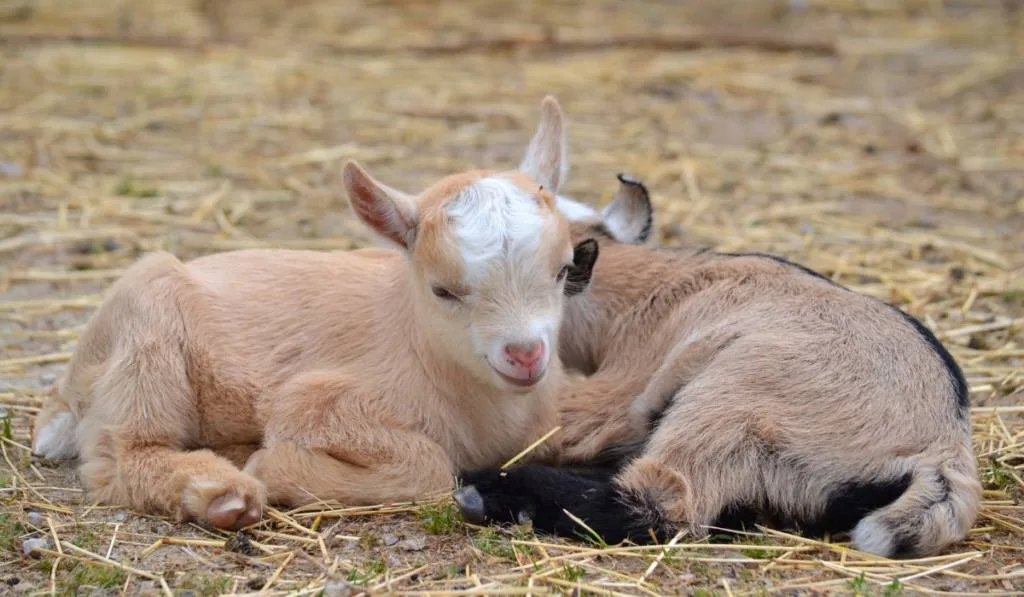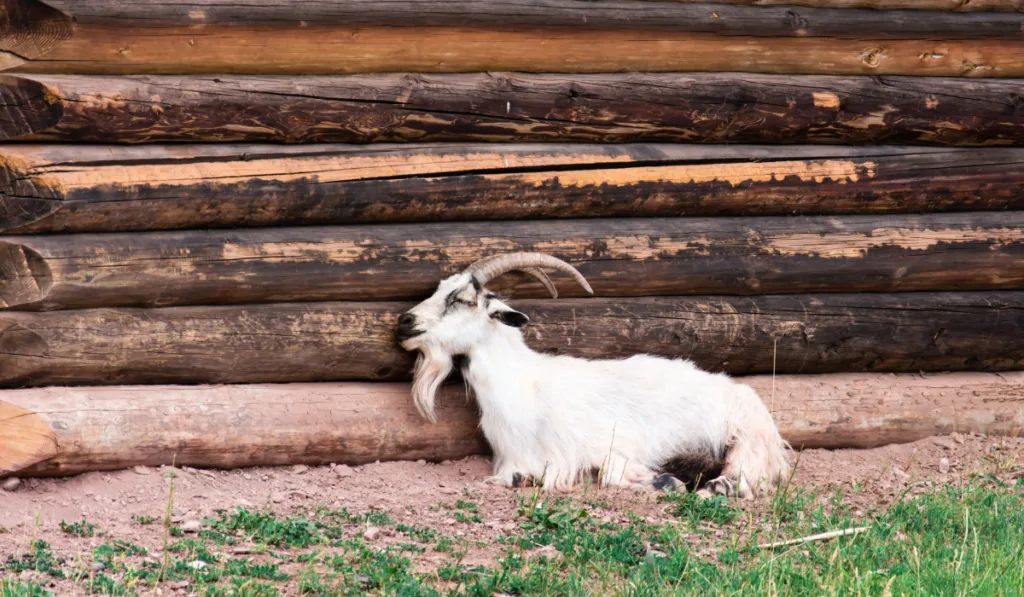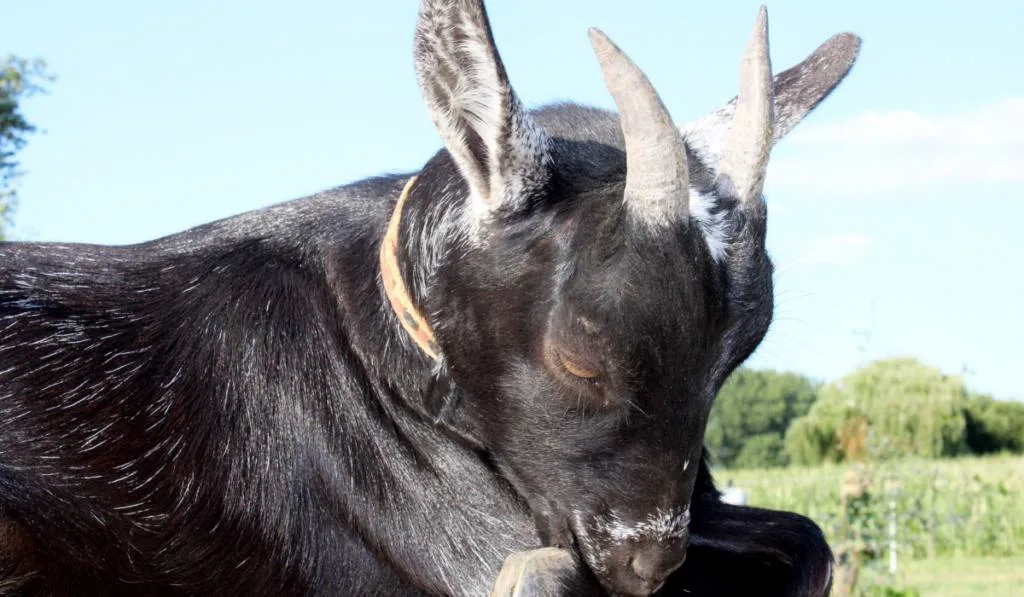Watching kids nursing is probably one of the most heart-melting things you’ll see; their little tails wagging from pure joy while suckling with gusto.
Goats are quirky, rambunctious creatures full of spark; you might think they require a lot of shut-eye to recharge, but it’s quite the opposite.
Goats do not sleep with their eyes open, though some people have observed kid goats with open eyes during REM sleep. Goats are not unihemispheric sleepers – where only half of the brain rests – but very light sleepers and close their eyes to sleep.

Due to their diet, herbivorous mammals, such as goats, sleep less than carnivores – a protein-rich diet packs more calories than eating foliage, which means that herbivores spend more time eating to get the required amount of energy from their food.
Being prey to all kinds of predators also contributes to their sleeping habits.
Table of Contents
Do goats sleep with their eyes open?
Kids can be seen with half-open eyes while in REM sleep; you’ll notice the eye movement immediately as it looks kind of strange at first until you realize they are in a deep sleep and probably dreaming of all the mischief they will get into when they wake.
It might be possible that adult goats will experience the same during REM sleep, but you will have to be very sneaky to find out.
While goats, especially goats in the wild, need a healthy sense of self-preservation, they close their eyes when they sleep. However, some animals can sleep with one or even both eyes open.
Unihemispheric sleeping occurs when one part of the brain stays alert, this is vital to species that need to perform specific tasks (such as not drowning) while they rest.
It also means that they can keep one eye open to spot any potential dangers.
Marine mammals (amongst others), such as dolphins, have this extraordinary ability. However, even as prey, the goat does not and sleep with their eyes open.
Some land mammals can be seen sleeping with their eyes open, such as rabbits, but this is more to keep an eye out for predators than experiencing unihemispheric sleep. In this article you’ll know if goats can see in the dark.
Sick goats
Some people had reported that sick kids never closed their eyes before they passed away. Through research, there was no reason why the baby goats did so.
And it might just be because they didn’t feel well. According to Jim and Debbie Hosley from Amber Waves in California, three behaviors need urgent veterinary assistance.
- Abnormal behavior such as isolating itself and sitting down often, and not moving.
- The goat is lethargic and lying down for long periods.
- When their midsections are bloated, this is a painful condition in goats, and they will often whine in pain.
Nothing suggests that goats keeping their eyes open is an indication of illness or injury.
Of course, at any time if you think your goat might be sick, be sure to call your local veterinarian for advice.
Interesting Facts About Goat Vision
If you think to leave the light on for them when you put them to bed, they won’t be too impressed with the gesture. Their vision is not nearly as good as an owl’s, but they can manage well enough in the dark.
Their pupils’ unique rectangular shape not only allows them to navigate at night but is roughly akin to having eyes at the back of their heads.
More accurately, they have an extensive field of vision, giving them a panoramic view of their surroundings. Goats can also see the colors yellow, orange, green, blue, and red.

How do goats sleep?
Goats lie down to sleep at night, not entirely on their sides, but more upright, making it easy to get up quickly when they need to.
It is not impossible to find one lying on its side, though you won’t easily catch them off guard. Goats, unlike elephants, do not sleep while in the standing position.
They are very light sleepers and wake at the faintest of sound; probably the reason why people never really see them sleep. Even domesticated goats will retain some of their instincts they need to survive in the wild.
Goats are herd (you can say social) animals and do not do well on their own; they enjoy snuggling up and resting their heads on other goats while sleeping.
Domesticated goats prefer to sleep in a three-wall shed as opposed to being enclosed by four walls.
They will need dry bedding as they tend to get sick easily (partly because they do not distinguish between “bathroom” and “bed”). Their bedding does not need to be replaced daily, but it needs to be mostly clean and dry.
You might find that half of the herd will sleep soundly while the other half appears to be more alert; this has nothing to do with insomnia but more about survival.
As mentioned earlier, goats will keep an eye out for dangers. After a few hours, they will switch and allow the others to get in their beauty sleep.
In winter, goats sleep in a barn to protect them from the cold. In places where it gets freezing cold, farmers or keepers of livestock will provide wood pellets or some form of raised bedding for the animals to sleep on at night.
They also suggest using wood shavings for the barn floor. In the summertime, goats can sleep outside on the ground or grass, but this might not be an option for your goats if you have predators around.
How many hours do goats sleep?
Some are convinced that goats, especially in the wild, do not sleep. This is not true; goats, like most animals, require sleep to stay healthy.
It might not be entirely in the same league as cats (sleeping away most of the day), but they need rest.
Goats sleep for about five hours a day, taking short naps during the day. Kids might sleep a little longer, as is standard with most newborn or young animals.
As mentioned earlier, goats sleep less than carnivores because of what they are and what they eat.

REM sleep
A study conducted by Dr. Klemm, working in the Department of Veterinary Integrative Biosciences at a Texas University, concluded that goats do sleep and have paradoxical sleep capacity (known as REM sleep).
This study proved that ruminants have the physiologic capacity for sleep and paradoxical sleep.
Daytime ruminant sleep in goats was transient and polyphasic, averaging 5.1 ± 0.6 minutes per episode. The frequency was variable, ranging from 0 to 6 episodes during daytime.
In addition, the goats exhibited paradoxical sleep, known as dreaming in man, with average durations of 5.5 ± 0.4 minutes.
Rumen contraction rates apparently had no causal relation to behavioral states, but rather were a consequence of the animals’ state of alertness
You might wonder what is meant by ruminants; cattle, sheep, goats, buffalo, deer, elk, giraffes, camels are examples of ruminants.
These animals have four compartments in their stomachs and not four stomachs, as some might think. Their unique digestive systems provide them with storage for food which they later regurgitate and re-chew.
The process of rumination occurs while the animal is resting (not sleeping).
Do wild goats sleep? (How do wild goats sleep?)
Wild goats, that is, goats that are not domesticated, are believed not to sleep at all. Since they also probably only sleep for about five hours a day (and very light at that), it would hard to prove or disprove this thought.
However, on the Animal Diversity Web, they state that goats dig burrows that they use as a dust bath and a resting spot during the day and night; this is a strong indication that goats sleep in the wild.
Conclusion
Goats sleep with their closed and only for around five hours at night while taking quick naps during the day.
While some might believe that wild goats do not sleep at all, this remains unproven since it is challenging to spot a sleeping goat in the wild, but that doesn’t mean they don’t sleep it all, just that we don’t see them when they do.
Resources
- https://scienceblogs.com/tetrapodzoology/2008/09/15/natural-history-of-sleep
- http://www.bbc.com/earth/story/20151029-what-is-the-sleepiest-animal-on-earth
- http://www.hillarys.co.uk/static/sleeping-habits-of-animals
- https://petstuffguide.com/do-goats-sleep-standing-up/
- https://www.researchgate.net/publication/17252193_Sleep_and_Paradoxical_Sleep_in_Ruminants
- https://en.wikipedia.org/wiki/Ruminant
- https://www.livescience.com/52540-goat-facts.html
- https://animaldiversity.org/accounts/Oreamnos_americanus/#behavior
